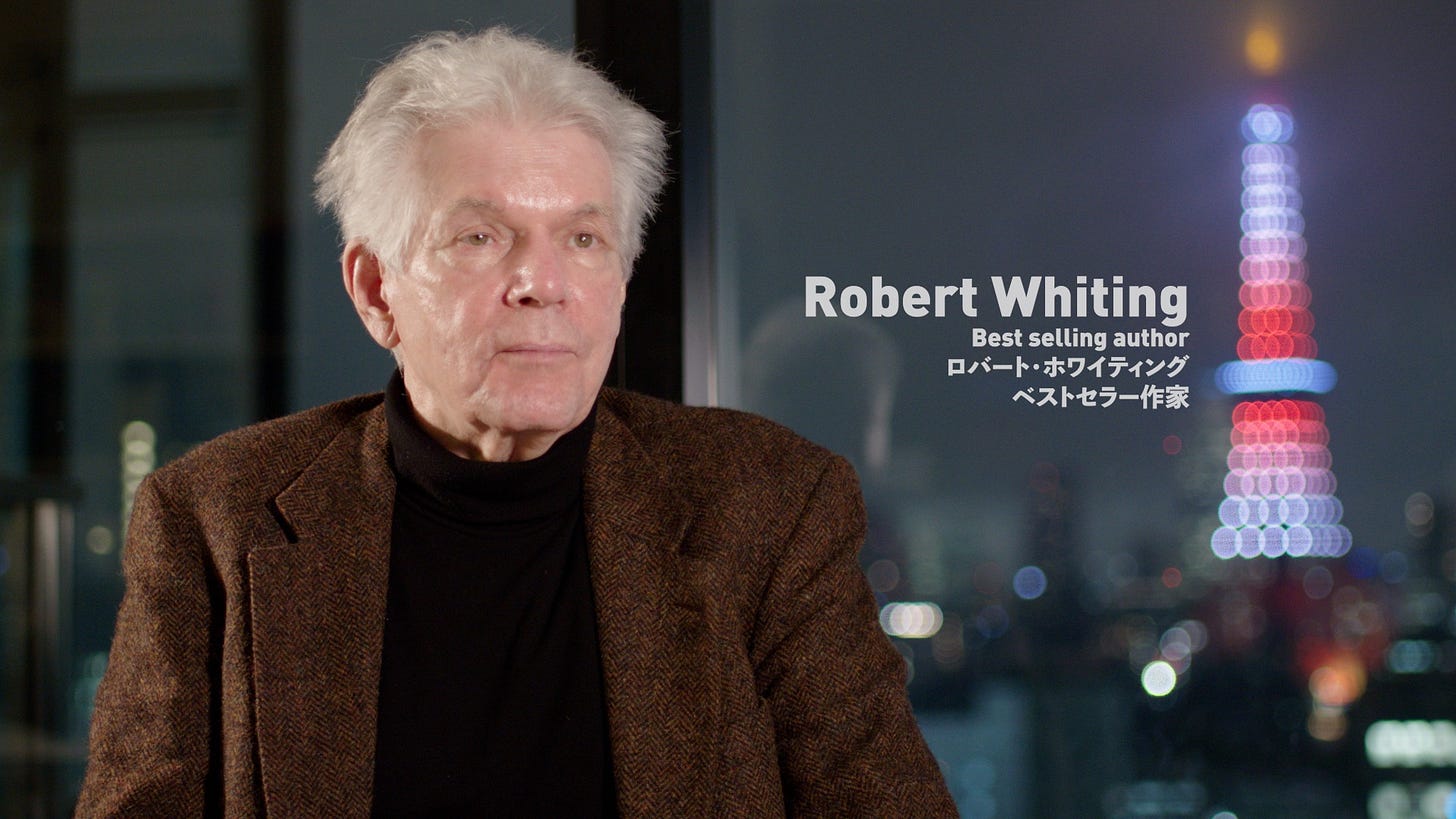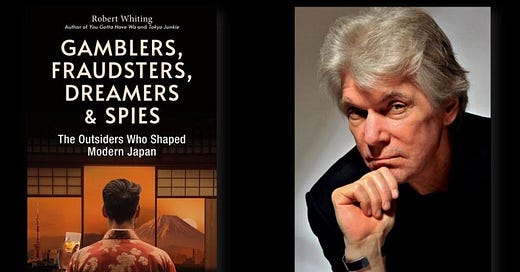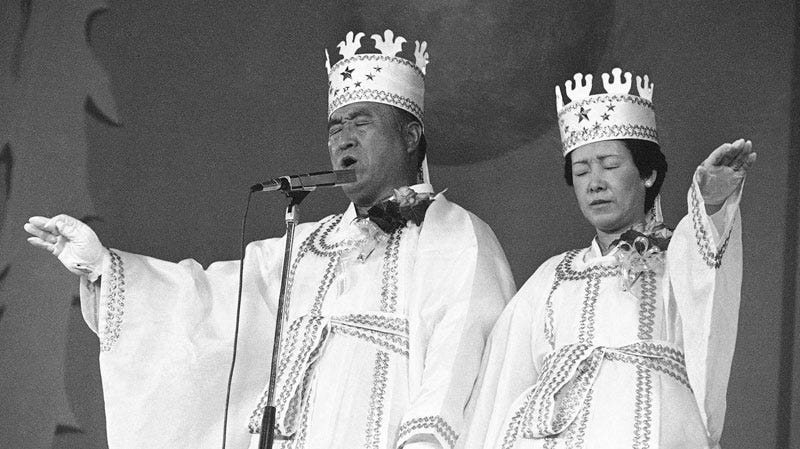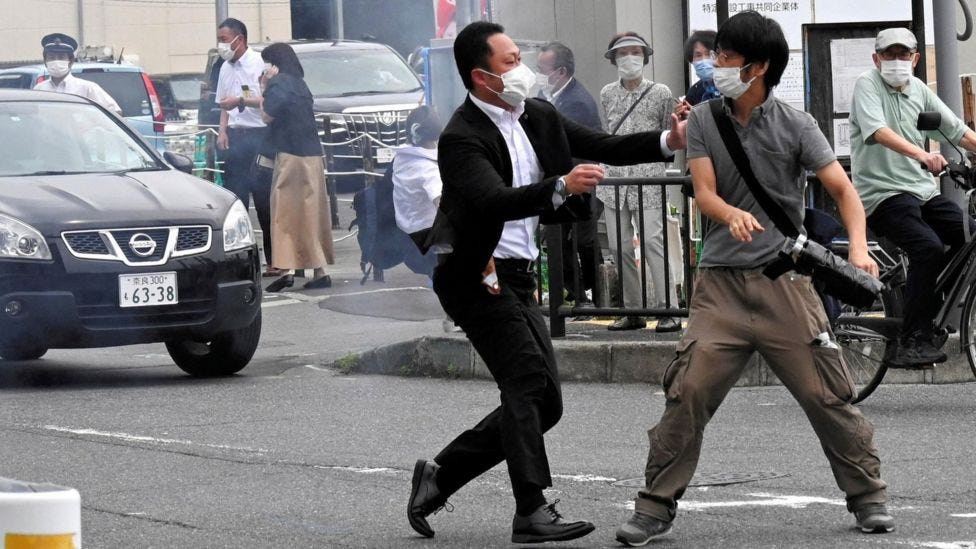Book Review: "Gamblers, Fraudsters, Dreamers & Spies: The Outsiders Who Shaped Modern Japan" by Robert Whiting
The best in the business, Robert Whiting, has delivered again
What if the rise of modern Japan wasn’t just shaped by its politicians, economists, and business leaders, but also by a motley crew of gamblers, criminals, dreamers, and spies? What if the people who made the biggest impact on Japan’s post-war transformation weren’t the heroes of history books, but the outsiders who operated in the shadows? Robert Whiting’s Gamblers, Fraudsters, Dreamers & Spies: The Outsiders Who Shaped Modern Japan takes you on a journey into the lives of these very figures, the risk-takers and rule-breakers who, through their daring and often illegal moves, changed the face of the country forever.
Whiting’s previous works like Tokyo Underworld and You Gotta Have Wa have explored both the criminal underbelly and Japan's love for baseball and in his latest work, Whiting brings us into the gritty, complex world of people who never quite fit into Japan’s rigid society but still managed to leave their mark. It navigates through a rogues’ gallery of characters who defied the norm to alter the country’s trajectory.

The individuals in this book span a wide spectrum, from post-war yakuza bosses and international spies to American hustlers and dreamers who saw Japan as a land of opportunity. Whiting masterfully draws out the connections between them, showing how their actions often altered the course of history in ways that went unnoticed by the general public.
Although not a main character in the book, anytime I can read about Yoshio Kodama, whose life I’ve also written about on my Substack, “Who is Yoshio Kodama?”, is always fun. Whiting wrote more about Kodama in Tokyo Underworld but he pops up again in this book. Kodama’s story reads like a thriller, blending high-level political influence, deep ties to organized crime, and covert involvement with the CIA. Kodama was a fixer, a nationalist, and a man who understood the power of operating in the shadows which is exactly the type of character Whiting excels at profiling, and trust me there are so many excellent stories in Gamblers, Fraudsters, Dreamers & Spies: The Outsiders Who Shaped Modern Japan that you’ll come back to it over and over again to read. In fact, what I love most about Whiting’s new book is that you can read the chapters randomly anytime you like and always come back and enjoy it over and over again.
Kodama’s life, like many of the other characters in this book, perfectly encapsulates the book’s central theme: that often, it’s not the lawful or moral figures who shape a nation, but the outsiders willing to take risks and bend the rules to win.
Whiting’s ability to turn history into an engrossing narrative is a true gift. His detailed research is balanced by a storytelling style that feels almost cinematic, making this book as thrilling as it is informative. The gamblers and fraudsters he writes about weren’t just criminals, they were visionaries who saw Japan as a landscape of opportunities, often daring to make moves that the conventional power structures could never imagine. Similarly, the spies and dreamers he profiles saw Japan as a key battleground during the Cold War, and their covert actions shaped both Japanese and international policy. I was surprised to also read about a CIA agent who has the same last name as me and I wrote about it on my substack too.
In Gamblers, Fraudsters, Dreamers & Spies: The Outsiders Who Shaped Modern Japan, Whiting also shows that it wasn’t always men who played dubious roles in shaping post-war Japan. Figures like Viscountess Tsuruyo Torio, with her scandalous affair with Charles Kades, a senior figure in the U.S. Occupation forces after World War II, had massive political influence. She proves that women, too, could wield power and stir controversy behind the scenes. Kades, a Harvard-educated lawyer, played a crucial role in drafting Japan's post-war constitution. Despite being married, he openly visited Viscountess Torio, with her husband's knowledge and approval. Their relationship became a notable scandal, and the Viscount even seemed proud of it, hosting Kades while maintaining his own extramarital affair.

My hands down favorite story from the book is the Moonies story. After the Korean War, the United States government, seeking to contain communism in East Asia, had the CIA play a pivotal role in establishing the Korean Central Intelligence Agency (KCIA) in 1961, modeled after the CIA itself. The KCIA's purpose was to protect South Korea from communist influence, particularly from the North, while serving as a tool for broader U.S. geopolitical aims in the region.
The KCIA quickly became intertwined with Sun Myung Moon’s Unification Church (known worldwide as the “Moonies”), a religious group with virulent anti-communist ideology. Brigadier General Kim Chong Pil, the KCIA’s founder, embedded several agents within the Church, recognizing its utility in combating communism.
With CIA backing, the Unification Church expanded rapidly, aligning with pro-American political forces in both South Korea and Japan. The CIA provided initial seed money and contacts to support Moon's ventures in the United States and the Unification Church’s influence spread globally, particularly in the U.S., where it was involved in various political campaigns. Moon's organization was seen as a tool to influence U.S. foreign policy, and its alignment with right-wing politicians further solidified its ties with intelligence agencies. The Church’s anti-communist stance and the covert support from both the CIA and KCIA helped it grow into a political force, using funds raised globally (mostly from Japan) to further its objectives.
The intricate relationship between Japan’s political elite, particularly former Prime Minister Nobusuke Kishi and his grandson, another former PM in Shinzo Abe, with the Moonies, is woven together brilliantly by Whiting. The Church, heavily supported by the KCIA and receiving financial backing from powerful Japanese ultranationalists like Kodama, gained influence within Japan’s ruling Liberal Democratic Party (LDP). Kishi's ties to the Church allowed the LDP to benefit from donations, free labor, and political support. This alliance continued for decades, with Abe maintaining close ties to the Church as well. Abe even sent congratulatory messages to Unification Church events as late as 2021, continuing the family’s connection with the organization and ultimately led to his assassination in 2022. The assassin blamed the Church for his family’s financial ruin (his mother had donated vast sums to the Church, driving the family into bankruptcy) and this personal connection, combined with the Church’s broader controversial practices in Japan, motivated the assassin to target Abe, believing that Abe’s political support for the Church was responsible for his family’s downfall.
For someone like me, who has long been fascinated by the intersection of politics, power, and morality, this book is an absolute gem. The way Whiting digs into the lives of the characters resonates deeply with my own interest in Japan’s hidden influencers. It’s these untold stories, of people who live on the margins but exert enormous influence, that truly shape a country’s identity. Whiting captures this theme brilliantly, drawing the reader into a world where the stakes are high, the moves are bold, and the consequences are often game-changing. The book doesn’t glorify these figures, but does argue that their roles were essential to Japan’s development, shedding light on a darker side of history that is often overlooked.
In Gamblers, Fraudsters, Dreamers & Spies: The Outsiders Who Shaped Modern Japan, Whiting presents a variety of compelling stories from Japan’s postwar underworld. Three of the most fascinating for me are:
The Canon Spy Agency: After WWII, Japan was a battleground for influence between the Allies and the Soviet Union. Whiting delves into the Canon Agency, a black-ops spy network created by US Army Major Jack Canon. Canon, a towering Texan with a background in explosives, was tasked with covert operations aimed at rooting out communist sympathizers and Soviet spies. His agency was involved in sabotage, drug smuggling, and even kidnapping double agents like Wataru Kaji, all in the name of keeping Japan under American influence. Canon recruited a diverse group of Euro-American, Nisei (second-generation Japanese), and Korean-American agents, setting new standards for postwar covert operations .
The Girard Incident: Details the killing of 46 year old Japanese woman Naka Sakai, by United States Army soldier William S. Girard in Soma, Gunma Prefecture on January 30, 1957. Sakai, a housewife who was collecting spent shell casings at a military base to sell for scrap, was killed when Girard shot an empty grenade cartridge at her, apparently for his own amusement. Sakai's death caused outrage from the Japanese public and the incident led to disputes between Japan and the U.S. Army over jurisdiction, resulting in the U.S. Supreme Court case Wilson v. Girard. Girard was demoted by the U.S. Army and received a three-year suspended sentence from Japanese authorities and led to a reduction of U.S. troops based in Japan.
The Korean Taxi Barons: Whiting profiles the rise of the Aoki family, ethnic Koreans who overcame discrimination to build MK Taxi, one of Japan’s largest taxi firms. Sadao Aoki, the family patriarch, battled both Japanese taxi competitors and government regulators, who were reluctant to see an ethnic Korean succeed. His son Masaaki Aoki, despite facing racism in both Japan and the US, eventually took over the business, leading it to new heights, including introducing revolutionary practices like late-night taxi services. The downfall of Masaaki makes for cliffhanging reading.
Gamblers, Fraudsters, Dreamers & Spies: The Outsiders Who Shaped Modern Japan is a must-read for anyone intrigued by Japan’s modern history, especially those curious about the unsung individuals who played critical roles in its rise as a global power. Whiting invites us to consider a more complex and nuanced version of history, where outsiders and misfits have just as much, if not more, influence as the celebrated figures we read about in textbooks. You won’t be disappointed by the tales of ambition, risk, and rebellion that shaped the Japan we know today.
Rionne McAvoy is the director of the award-winning documentary The One's Left Behind: The Plight of Single Mothers in Japan, showcasing his dedication to addressing pressing social issues. A committed documentary filmmaker and professional wrestler, he explores critical themes with passion and insight. Additionally, he has a keen interest in post-World War II Japan, particularly the intricate connections between politicians and gangsters during that era. Known in the wrestling ring as Rionne Fujiwara, he brings the same determination and storytelling prowess from his wrestling persona to his filmmaking endeavors.










Sounds like a great read.